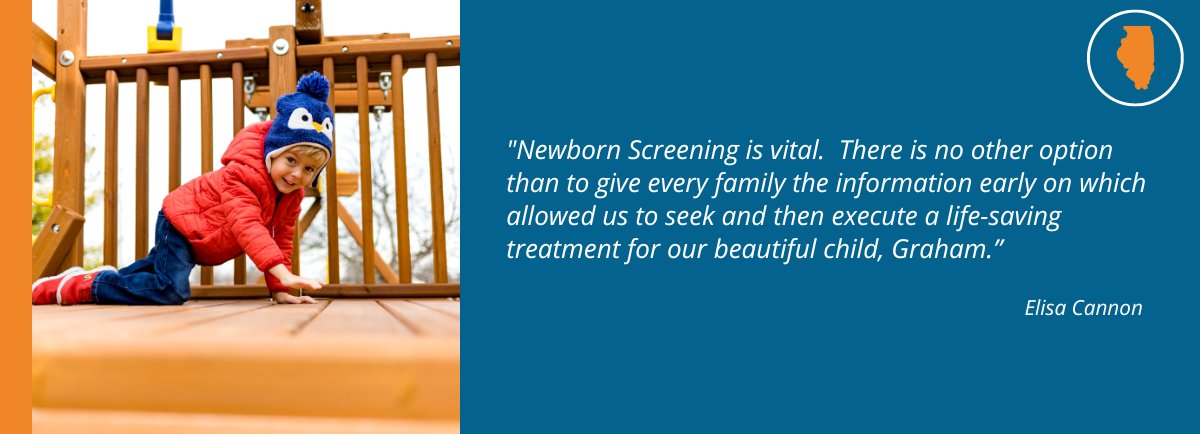DOWNLOAD STATE FACT SHEET AS PDF

In 2020, there were 133,298 live births in Illinois2 There are 57 conditions on the Illinois Newborn Screening Panel3
All babies in the United States are screened for several conditions shortly after birth. Approximately 24-48 hours after a baby is born in the United States, the heel is pricked by a nurse to collect a small sample of blood. Afterwards, the nurse puts a series of blood drops onto a filter paper to create several “dried blood spots.” Next, the newborn screening card is sent to the state laboratory for analysis. Illinois is 1 of 11 states currently testing for Krabbe disease. Illinois started screening for Krabbe disease in December of 2017.
What is Krabbe Disease?
Krabbe disease (pronounced krab A), is a rare genetic disorder, also known as globoid cell leukodystrophy. In the United States, Krabbe disease has been reported to affect approximately 1 in 100,000 individuals. Infantile Krabbe disease is the most common and severe form causing infants to lose the ability to eat, extreme irritability, inability to sit up, grasp objects, blindness, and seizures. Sadly, infants die within the first 2-3 years of life in states that do not test for Krabbe disease. We invite you to learn more about Understanding Krabbe Disease.
Why Screen for Krabbe Disease?
Krabbe disease is a severe neurodegenerative and rapidly progressing condition requiring immediate treatment for the most severe forms. The medical issues and symptoms of Krabbe disease are very significant and life-impacting. A delayed diagnosis, especially in the most severe forms, equates to palliative and supportive care as the only means of treatment until premature death.
Krabbe Disease Hero: Graham Cannon

See all our Krabbe Disease Heroes.
Elisa and Derek were delighted to welcome Graham into their family in 2018. Not long after he was born, they received a call from his pediatrician about his Newborn Screening results. The pediatrician said that Graham was positive for Krabbe disease. Their new bundle of joy was scheduled an appointment with a geneticist that same week. Because Graham was born in Illinois, he was screened for Krabbe disease at birth – most states are not yet screening for it. There was some uncertainty from the geneticist as to what the next steps would be, so Elisa and Derek learned as much as they could on their own while they waited for the genetic confirmation and prepared to head to Pittsburgh for an evaluation with Dr. Maria Escolar. They were relieved to be under her care as she made the unknown aspects of the disease a little clearer.
Graham received a life-saving stem-cell transplant at the Children’s Hospital of Pittsburgh and now loves playing outside, swimming, driving his jeep, making cookies, going to school, and playing with his brother. He loves going to school and enjoys his therapies (physical, occupational, and speech). When it’s nice outside, Graham loves going to local parks where he can swing, go down slides, climb rock walls, and tries to avoid falling in “hot lava.”
Their journey continues to be difficult even though Graham has done amazing every step of the way. Elisa and Derek believe that Newborn Screening for Krabbe disease is vital: “There is no other option than to give every family the information early on which allowed us to seek and then execute a life-saving treatment for our beautiful child, Graham.”
Resources
- The Leukodystrophy Newborn Screening Action Network is dedicated to advancing newborn screening for leukodystrophies and lysosomal storage disorders, supporting newly-diagnosed families, and ensuring collaboration between all stakeholders. Learn more at https://ldnbs.org/.
- CDC offers funding and assistance through the Newborn Screening Quality Assurance Program (NSQAP). More information can be found at https://www.cdc.gov/labstandards/nsqap.html.
- Baby’s First Test provides funding opportunities through grants. Learn more at https://www.babysfirsttest.org/newborn-screening/funding-opportunities.
- American Public Health Laboratories NewSTEPS program provides data, technical assistance, and training. Details at https://www.newsteps.org/.
- KrabbeConnect offers patient support services to help families navigate the burden of Krabbe disease. Learn more at https://krabbeconnect.org/.
- Hunter’s Hope Foundation is a non-profit organization committed to giving hope through education, awareness, research, and family care for all leukodystrophies. Learn more at https://www.huntershope.org/.
Citations
- Wenger DA. Krabbe Disease. 2000 Jun 19 [Updated 2011 Mar 31]. In: Pagon RA, Adam MP, Ardinger HH, et al., editors. GeneReviews® [Internet]. Seattle (WA): University of Washington, Seattle; 1993-2017.
- “Fertility Rate: Illinois, 2010-2020.” March of Dimes | PeriStats, https://www.marchofdimes.org/peristats/data?reg=99&top=2&stop=1&lev=1&slev=4&obj=1&sreg=17&creg. Accessed 31 July 2023.
- “Illinois| Baby’s First Test | Newborn Screening | Baby Health.” Babysfirsttest.org, 2015, https://www.babysfirsttest.org/newborn-screening/states/new-jersey. Accessed 31 July 2023.
All information in this fact sheet is based on data available before July 31, 2023.


